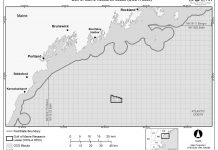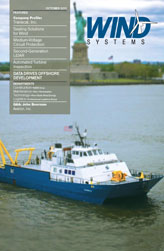Companies often forget seemingly simple things while handling the logistics of wind components within North America. What is assumed within U.S. borders doesn’t necessarily hold true for Canada or Mexico. These assumptions can have painful consequences, especially with time-sensitive cargo.
I have found that often companies have less difficulty importing from another continent than across U.S. borders with Canada and Mexico. While distance and time required for trans-ocean shipments focuses the reality of what is required to execute the transaction, often this is not the case within North America where the cargo is most likely transported by rail or truck. One can easily assume that since rail or truck is being used, trans-border shipments should be straightforward. There are a couple of reasons why companies make such assumptions. One is NAFTA and the perception that all rules and regulations are the same for all three countries. Another is the relatively easy border crossing between countries. The fact is that it all comes down to the flow of material, money, and information.
Material: The cargo doesn’t change, but the way it is transported may differ between countries. Material handling regulations will vary, so what is good enough in Mexico may not be approved in the U.S. Such differences often cause delays at the border.
Money: What currency should you use for financial transactions? This needs to be determined before a project is started. Local companies may want to be paid in local currency, while international companies may not. One needs to be able to handle cross-currency transaction efficiently so as not to delay shipment.
Information: This logistic flow is what I consider the most critical issue for project execution. Many a project has been delayed because the type and format of information between countries differ. Days can be lost because a master bill of lading differs in type of data required in one country versus what is required in another. This can be especially critical in Mexico because of the translation between Spanish and English. Personnel that handle the critical documents that allow flow of cargo usually work within strict guidelines and may have difficulty with minor errors. Often new paperwork has to be resubmitted rather than an error corrected on the original. Many shipments have been delayed because paperwork was not correctly submitted.
Information used for safely handling and securing cargo needs to be assimilated at the loading site. This means instructions and procedures created in one country need to be thoroughly understood in another. A rule that is assumed in U.S. may not be followed in Mexico since it is not the norm. Time has to be spent with the local personnel reviewing pertinent material handling and cargo securing information.
How are these unnecessary complications avoided? The answer is both simple and difficult. The simple part involves proper advance planning and analysis of the project. The difficult part is anticipating all the issues that may arise, and planning for them. Before the start of the project I suggest the following steps:
• Draft a plan for flow of material, money, and information. This can be as simple as one sheet of paper for each flow, or as complex as using formal project management tools.
• Enlist many people to collaborate during the creation of the plans. Doing this fills in the so-called holes in a plan.
• Create a contingency document for the project. This is what I call “if this happens, do this” document. You may not know all the answers if something goes wrong, but you probably know where to find the answers.
• Review the plans with all parties involved. Making sure the customs broker understands what is being shipped beforehand can save time while processing commercial invoices for clearance, for example, or that the banker understands your requirements for currency conversion can allow a smooth execution of the transaction.
• Having logistic personnel with country experience is critical. Relationships with Canadian and Mexican logistics expertise can make all the difference in a successful project.
Successful transportation projects depend on paying attention to the smallest details. Understanding this can make all the difference in the world.




































